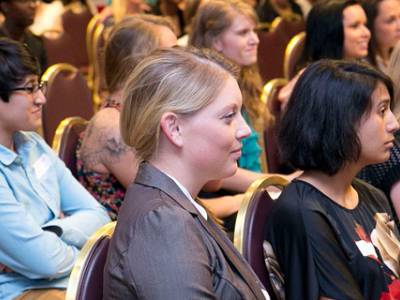Wharton for Women?

Posted Jul 26, 2011 18:52
Hi, I'm new to this board, my name is Jill and I'm from New Jersey.
I am looking for MBA programs - and saw that Wharton has increased the number of women in it's program to something like 45%. This is higher than most other MBA programs (but still a bit disconcerting since women outnumber men on a societal level.)
So I started thinking - for a woman, is it better to apply for a school that accepts more women? Or, alternatively, should I look for programs that have lower percentages of women students? Would my gender be an advantage in this case? I mean, only 35% of the students at Columbia are women - maybe my odds are better there?
Hi, I'm new to this board, my name is Jill and I'm from New Jersey.
I am looking for MBA programs - and saw that Wharton has increased the number of women in it's program to something like 45%. This is higher than most other MBA programs (but still a bit disconcerting since women outnumber men on a societal level.)
So I started thinking - for a woman, is it better to apply for a school that accepts more women? Or, alternatively, should I look for programs that have lower percentages of women students? Would my gender be an advantage in this case? I mean, only 35% of the students at Columbia are women - maybe my odds are better there?
Posted Jul 26, 2011 19:13
I think this is a really personal choice. I think women and men both have a much better experience in a program where the genders are more balanced: Wharton; Yale; Stanford... Generally, you'll stand a better chance of admission and financial aid in a program where you'll add more rather than less to the diversity: Cornell, Darden, Georgetown; Maryland; Carnegie Mellon, Purdue....
I think this is a really personal choice. I think women and men both have a much better experience in a program where the genders are more balanced: Wharton; Yale; Stanford... Generally, you'll stand a better chance of admission and financial aid in a program where you'll add more rather than less to the diversity: Cornell, Darden, Georgetown; Maryland; Carnegie Mellon, Purdue....

Posted Jul 28, 2011 18:30
I graduated from Columbia, and while it doesn't have the highest level of gender diversity (I think it's about 35% today), it is rising.
At least at Columbia - as a relative minority, you have an excellent support network. There's an organization called "Columbia Women in Business" that hosts networking events and other activities - and it was very helpful to some of my female friends in the program.
I'd imagine that other top schools have similar organizations - and it's just a matter of finding them and getting involved.
I graduated from Columbia, and while it doesn't have the highest level of gender diversity (I think it's about 35% today), it is rising.
At least at Columbia - as a relative minority, you have an excellent support network. There's an organization called "Columbia Women in Business" that hosts networking events and other activities - and it was very helpful to some of my female friends in the program.
I'd imagine that other top schools have similar organizations - and it's just a matter of finding them and getting involved.
Posted Aug 06, 2011 19:27
Thanks both. I'll look into those kinds of organizations - there might be some good ones at other campuses too!
Thanks both. I'll look into those kinds of organizations - there might be some good ones at other campuses too!
Related Business Schools
Stanford, California
99 Followers
171 Discussions
College Park, Maryland
16 Followers
30 Discussions
Pittsburgh, Pennsylvania
38 Followers
92 Discussions
Philadelphia, Pennsylvania
68 Followers
175 Discussions
Charlottesville, Virginia
27 Followers
63 Discussions
New York City, New York
159 Followers
259 Discussions
Ithaca, New York
89 Followers
136 Discussions
Washington, District of Columbia
27 Followers
57 Discussions
New Haven, Connecticut
43 Followers
62 Discussions
West Lafayette, Indiana
20 Followers
82 Discussions
Other Related Content
Gender Equality in MBAs
Article
Apr 03, 2017
Women have traditionally been under-represented in MBA programs—but that seems to be changing

-(1)-94485.jpeg)


